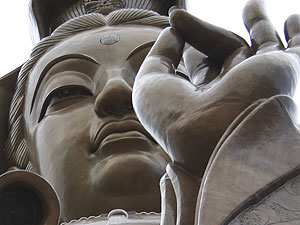Reason for the Season: Bohdi Day Explained
by Sage Schaff, CWRU Observer, December 9, 2011
New York, USA -- One need only turn on the radio or watch a few commercials to see that Christmas season is now in full swing. However, for the millions of Buddhists in America and hundreds of millions around the world, yesterday was an important day to the history of their faith.
 In general, Buddhism embraces the idea that suffering arises from confused states of mind and attachment to the notion that things are permanent. Happiness can be achieved by practicing virtue and performing positive actions, which are said to be repaid through karma.
In general, Buddhism embraces the idea that suffering arises from confused states of mind and attachment to the notion that things are permanent. Happiness can be achieved by practicing virtue and performing positive actions, which are said to be repaid through karma.
Dec. 8 is Bodhi Day, which marks the enlightenment of Siddhartha Gautama and his transition to the Buddha. According to tradition, he abandoned ascetic practices and resolved to meditate until he discovered the root of suffering.
It is said that in the first stage of Siddhartha's meditation, he accessed all of his past thoughts and deeds. This reflection led to the establishment of the cycle of rebirth, as he realized that he had been and would continue to be reincarnated many times.
Later in the evening, Siddhartha realized the existence of karma. He felt that his life was inextricably connected to the lives of all other sentient beings. This is the belief that underlies the concept of karma, which dictates that destiny is the product of the consequences of every single action one takes.
Finally, after further contemplating cause and effect, Siddhartha created the Four Noble Truths. This concept revolves around the idea that suffering can be ended by ridding oneself of all attachment to desires.
After this third revelation, Siddhartha's enlightenment was complete and he achieved nirvana. This idea is the main cause for celebration of the holiday, as it is a central concept. Services and traditions vary among Buddhist sects, but many adherents observe the day's significance with additional meditation, studying the Dharma, and performing kind acts for others.

 In general, Buddhism embraces the idea that suffering arises from confused states of mind and attachment to the notion that things are permanent. Happiness can be achieved by practicing virtue and performing positive actions, which are said to be repaid through karma.
In general, Buddhism embraces the idea that suffering arises from confused states of mind and attachment to the notion that things are permanent. Happiness can be achieved by practicing virtue and performing positive actions, which are said to be repaid through karma.